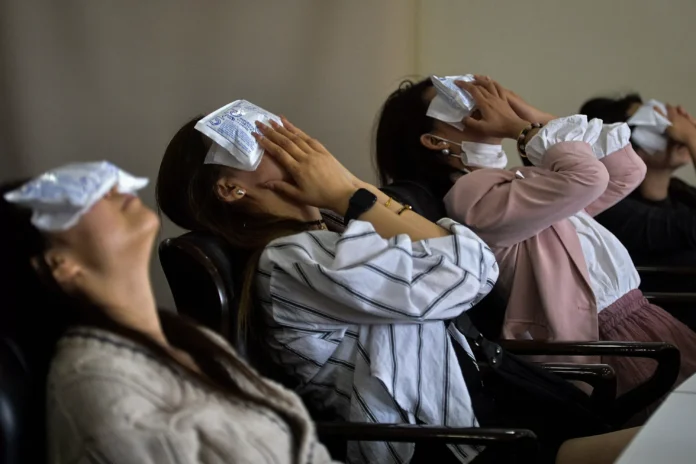Recent studies have shown that Generation Z, the generation born between the mid-1990s and early 2010s, is experiencing premature aging due to the early use of makeup and chemical creams. This alarming trend has been brought to light by Yakup Ç, an expert in cosmetic surgery, who has been studying the effects of these products on young skin.
In today’s society, the pressure to look perfect is higher than ever before. With the rise of social media and the constant bombardment of images of flawless celebrities and influencers, young people are feeling the need to achieve the same level of perfection. As a result, they are turning to makeup and chemical creams at a much younger age than previous generations.
However, what many young people fail to realize is that these products, if used excessively and at a young age, can have detrimental effects on their skin. According to Yakup Ç, the skin of Generation Z is becoming more and more sensitive to these products, leading to premature aging.
One of the main culprits is makeup. While it can enhance one’s features and boost confidence, it can also cause damage to the skin if used excessively and at a young age. The skin of young people is still developing and is more delicate, making it more susceptible to the harsh chemicals found in makeup products. These chemicals can clog pores, leading to breakouts and acne, and can also cause the skin to lose its natural elasticity, resulting in premature wrinkles and fine lines.
Moreover, the use of chemical creams, such as anti-aging creams, at a young age can also have adverse effects on the skin. These creams contain strong chemicals that can strip the skin of its natural oils and disrupt its delicate balance. This can lead to dryness, irritation, and even allergic reactions. In the long run, it can also cause the skin to age faster, making it look dull and lifeless.
Yakup Ç’s research has also revealed that the use of makeup and chemical creams at a young age can have psychological effects on young people. The constant need to look perfect and the fear of not meeting society’s beauty standards can lead to low self-esteem and body image issues. This can have a significant impact on their mental health and overall well-being.
So, what can be done to prevent premature aging in Generation Z? The answer is simple – education and moderation. It is crucial for young people to understand the potential risks of using makeup and chemical creams at a young age. They should be educated about the importance of taking care of their skin and the harmful effects of excessive use of these products.
Furthermore, moderation is key. Young people should be encouraged to embrace their natural beauty and not feel the need to constantly cover it up with makeup. They should also be mindful of the products they use and opt for more natural and organic options. This will not only be beneficial for their skin but also for the environment.
In addition, Yakup Ç suggests that young people should start incorporating a skincare routine into their daily lives. This includes cleansing, toning, and moisturizing, which will help keep their skin healthy and youthful. They should also wear sunscreen daily to protect their skin from the harmful UV rays of the sun.
It is also essential for parents to play a role in preventing premature aging in their children. They should educate their children about the potential risks of using makeup and chemical creams at a young age and monitor their usage. They should also encourage their children to embrace their natural beauty and not succumb to societal pressures.
In conclusion, the recent studies conducted by Yakup Ç have shed light on the alarming trend of premature aging in Generation Z. It is crucial for young people to understand the potential risks of using makeup and chemical creams at a young age and to embrace their natural beauty. With education, moderation, and a proper skincare routine, we can help prevent premature aging and promote healthy and confident young individuals. Let’s work together to break the cycle of societal beauty standards and embrace our unique and natural selves.


